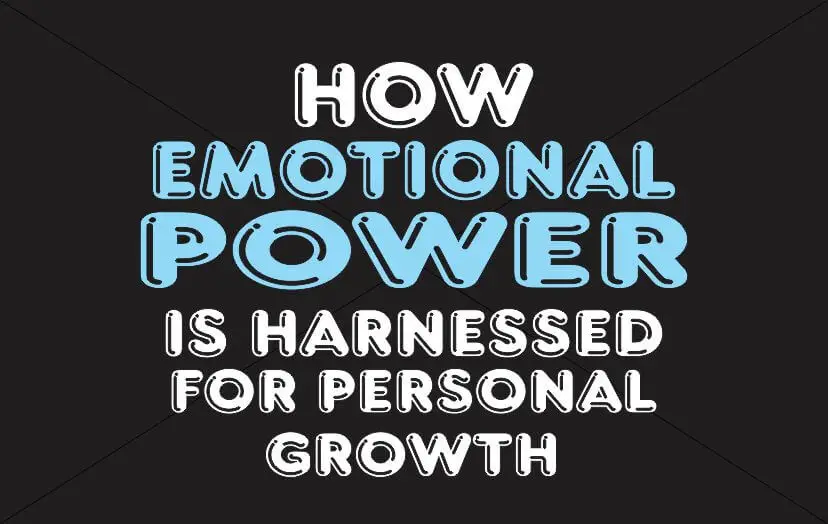Emotional power has a remarkable influence with a firm grip on human lives, driving thoughts and behaviours either to make or mar us.
From our relationships to professional careers and intrapersonal relationships, our inner emotional well-being can have far-reaching effects that we may not be aware of.
This is why it’s crucial to understand your emotional power and how to harness it for emotional strength, especially as it concerns your integration and personal growth in society.
We will treat the subject of emotional power and how it is harnessed and applied for personal growth in this comprehensive article.
Whether you are seeking to improve your mental and emotional well-being, enhance your relationships, or up your career, this post aims to equip you with the knowledge and tools necessary for handling your emotions and using them to your advantage.
Before diving deep into the core of the power of emotions, we have to refresh our minds or familiarize ourselves with what emotions are.
A Brief Explanation of What Emotions Are
Emotions are a complex and intense set of psychological and biological responses to different external and internal stimuli. Sounds complex right?
Emotions are conscious reactions of mental origin, such as anger, happiness, love, gratitude, or sadness, mostly directed to a specific object.
When you are emotionally charged, your response is usually followed by physical changes in the body like increased heart rate, sweating, gastrointestinal changes, cutaneous blood flow that results in blushing, and others, depending on the emotion at play.
Emotions are important in human psychology because they help us to understand, regulate, and express ourselves and our relationships with others.
Emotions are an essential part of our physical, cognitive, and social development as they help us to navigate the world around us, understand our experiences, and form our sense of self.
They can also be regulated through strategies such as mindfulness, cognitive reappraisal, and behavioral activation.
See a dedicated article on emotional awareness and management.
Now that we are abreast of what emotions are, let’s get to the business of the day.
What is Emotional Power?

Emotional power is the ability to evoke intense feelings or emotions within yourself or others to achieve a purpose.
All areas of our lives are driven by emotions and feelings as it is firmly attached to decision-making and choices.
So, emotions can be easily harnessed or triggered to achieve a purpose. It can be used to inspire, motivate, persuade, or manipulate others.
Emotions such as fear, love, anger, and happiness can have a strong impact on people and can be used to influence their behavior or as a tool for manipulation.
A person who has mastered the power of emotions to navigate society is said to have emotional power.
Related Posts
- 10 Powerful Emotions Used in Persuasion
- Using Emotional Power For Persuasion
- How to Master Your Emotions
Benefits of Emotional Power
Emotional power is a dynamic force that influences how we relate, grow, and thrive.
When harnessed wisely, it enhances every aspect of life—from communication to creativity and mental well-being.
Improved communication builds understanding through honest emotional expression
Emotional power enables you to express yourself clearly and constructively.
This creates space for honest dialogue, reduces misunderstandings, and fosters empathy, making your conversations more meaningful and your relationships more deeply connected.
Enhanced relationships grow through emotional authenticity and compassion
Being in tune with your emotions helps you relate to others on a genuine level.
This nurtures trust, encourages mutual support, and strengthens the emotional bonds that hold personal and professional relationships together.
Self-awareness and personal growth flourish through emotional insight
Understanding your emotions helps you make better choices and react thoughtfully.
Emotional power promotes personal development by revealing your motivations and empowering you to grow with greater confidence, resilience, and intentionality.
Emotional intelligence sharpens your ability to navigate social dynamics
Recognizing and managing emotions, both yours and others’, increases your emotional intelligence.
This skill enhances your ability to collaborate, resolve conflicts, and lead effectively in personal and professional settings.
Empathy and compassion create meaningful human connections
Emotional power allows you to deeply feel what others feel.
This encourages genuine compassion, encourages active listening, and helps you build inclusive and supportive environments where people feel seen, heard, and valued.
Motivation and resilience thrive when emotions drive you forward
Emotions can ignite determination and push you through adversity.
When you harness emotional power, you tap into a deep well of motivation and develop the strength to overcome challenges with courage and perseverance.
Creativity and innovation expand through emotional exploration
Embracing emotions boosts imagination and encourages unconventional thinking.
Emotional depth allows you to see new possibilities, fuel innovation, and solve problems with a creative, open-minded approach.
Persuasion becomes powerful when emotions align with experience
Tapping into emotions helps you influence others effectively.
By connecting emotionally with an audience, you can hold their attention, resonate with their experiences, and communicate messages in a way that moves them to action.
Pitfalls of Emotional Power
While it is beneficial as described above, it can also have disadvantages if mishandled.
Here are some dark areas:
- Being too emotional can cloud judgment and lead to irrational decision-making.
- Emotional manipulation can be perceived as insincere or manipulative, leading to a loss of trust and credibility.
- Overreliance on this power can lead to a lack of critical thinking and intellectual analysis.
- Emotions can be contagious, and using them inappropriately can create a negative environment or cause others to feel uncomfortable or intimidated.
- It can lead to impulsiveness and overreacting, which may cause unintended consequences.
- For those who don’t have emotional power, it may seem like an unfair advantage or a means of coercion.
- Overusing the power of emotions can lead to burnout and emotional exhaustion.
How to Harness Emotional Power
Harnessing emotional power means transforming feelings into strength, insight, and meaningful action.
It involves awareness, regulation, and purposefully channeling emotions for personal and interpersonal growth.
Cultivate emotional awareness by identifying and accepting your feelings
Begin by tuning into your emotional experiences without judgment. Observe how your emotions arise, what triggers them, and how they influence your thoughts, actions, and well-being.
Awareness lays the foundation for emotional mastery.
Develop emotional intelligence to regulate and respond wisely
Emotional intelligence helps you manage your own emotions and understand others’.
It involves recognizing emotional cues, staying in control during emotional moments, and responding thoughtfully rather than impulsively in any situation.
Channel emotions into purposeful and productive action
Use emotional energy to move forward in life. Whether it’s passion that drives a cause or determination to reach a goal, channeling your emotions into focused action leads to fulfillment and progress.
Build emotional resilience by learning to bounce back from setbacks
Instead of suppressing negative emotions, acknowledge them and use them to grow.
Resilience allows you to face adversity, adapt under pressure, and emerge stronger with every emotional challenge you overcome.
Strengthen empathy and connection to deepen your relationships
Harness emotional power to show genuine understanding and compassion.
When you recognize and validate the feelings of others, you build trust, enhance communication, and foster meaningful connections in all areas of life.
Communicate effectively by expressing emotions with honesty and respect
Emotional strength enhances how you speak and listen.
Express your feelings clearly and authentically, practice active listening, and respond with empathy, creating space for openness, trust, and connection in every conversation.
Emotional self-care
Recognize the importance of self-care for emotional well-being.
Engage in activities that nourish and recharge you emotionally, such as practicing mindfulness, engaging in hobbies, spending time with loved ones, or seeking support when needed.
Harnessing Emotional Power for Personal Growth

Harnessing your power of emotions can help you rediscover yourself and your competencies and align yourself on the path of growth and development.
But, how can you effectively use this power to your advantage?
The Potential of the Power of Emotions for Personal Development
It can be a fuel that enables you to transform your life and move towards growth and personal development.
When you learn to recognize, understand, and integrate your emotions into your life, you harness the power that propels you to respond to life’s challenges more effectively.
This potential is that the power can help you better understand yourself and connect with others, promoting personal growth and development.
Role Of Emotional Intelligence in Harnessing Emotional Power
Emotional intelligence is critical in harnessing the power of emotions because the recognition and management of emotions rest on its foundation.
Emotional intelligence enables you to become more aware of your emotions and how they impact your thoughts and behaviours.
It helps you better understand your relationships with others and how your actions can affect them, making it easier for you to communicate effectively.
Practical Techniques and Exercises for Developing and Harnessing the Power of Emotions
Practical techniques and exercises can be applied to harness this power fully, helping us develop our emotional intelligence and resilience.
These include practicing mindfulness and meditation techniques to help us become more aware of our thoughts and emotions.
Also, using positive affirmations and visualization techniques can enhance our overall mood and establish a positive mindset.
Personal resilience can also be developed by focusing on building healthy habits, such as exercising regularly, eating healthy, and getting enough sleep.
Practicing emotional self-care is an essential part of harnessing emotional power, which promotes personal growth and development.
Frequently Asked Questions
How do you harness the power of emotions?
Cultivate self-awareness, regulate emotions, build resilience, and align goals with your emotional values to channel emotional energy into meaningful personal and interpersonal growth.
How can emotional power be harnessed for personal growth?
Develop self-awareness, manage emotions wisely, and pursue goals that align with your emotional values to encourage continuous learning, confidence, and long-term personal development.
Can emotional power be used to overcome obstacles and setbacks?
Yes. Emotional power, like resilience and determination, helps you navigate challenges, bounce back from failure, and grow stronger through adversity and self-reflection.
Are there any risks associated with harnessing emotional power for personal growth?
Yes. Without regulation, emotions can become overwhelming. Poor coping or self-criticism may hinder growth; seek support to manage emotions and foster healthy development.
Conclusion
Emotional power is an essential aspect of personal growth that can be harnessed and applied in different ways.
Emotions can either motivate or hinder your personal growth, depending on how you deal with them.
Being emotionally intelligent allows individuals to have control over their emotions and harness their energy for personal development.
Emotional intelligence can be developed through self-awareness, self-regulation, motivation, empathy, and social skills.
By learning how to manage your emotional power, you can gain a deeper understanding of yourself, improve your relationships, achieve success, and overcome challenges.
References:
Pyo Merez (PsyD) is a distinguished adolescent and adult psychologist at the forefront of mental health advocacy.
With expertise in cognitive and developmental psychology, focusing on social relationships, cultural contexts, and individual differences, Pyo has dedicated his career to empowering adolescents and adults.
As a sought-after speaker and panelist, Pyo shares invaluable insights on issues affecting young people, contributing to a deeper understanding of mental health and well-being in today's society.

